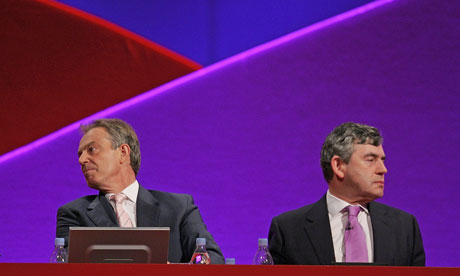
In life, as in the index, Brown follows Blair. The result? Defeat, disaster and derangement according to the former prime minister's memoirs, which are in one sense a sustained answer to the most important question about their shared government. Did they disagree about policy, or personality, or both?
Easy wisdom paints their relationship as a tragedy: two men, the best of friends with a shared ideological project, pulled apart by jealously. It was all a terrible clash of personality and the loser was Labour.
Except according to Blair it wasn't like that at all. Yes, there is lots in the book to justify that old slogan the Democrats used against Barry Goldwater: "In your guts you know he's nuts." Brown was nuts, at least according to the Blair version (and he's surely right). "More like a cult than a kirk," he says of Brown's allies.
But, as he says – repeatedly – Brown didn't lose because he was a bit weird socially. He lost because he was wrong.
This insight will upset Blair's party (or is it former party?). Almost all of those still in it believe the financial crisis demanded the massive expansion of the state. They think the deficit was unimportant. They think tax rises were morally and economically correct. They turned against markets.
And Blair thinks they were wrong about all of this. It's this that counts: not the fact that Brown was bad at small talk and chewed his fingernails.
The frivolities of the relationship between the two men will probably dominate the immediate response to Blair's book. People will comb it for juicy details of their rows: Brown locking himself in a toilet (by accident) while the pair discussed who should be the next leader. Brown demanding Blair's job. Brown as "the combination of the brilliant and the impossible". But the appeal of this soon fades. What lasts – and matters much more – is Blair's sustained attack on Brownite ideology. "I felt sorry for the party," he says as Brown stages yet another inept coup to remove him. "It was going to be a disaster." Not, he adds, because Brown was unelectable as a man but because, underneath, Blair knew him to be just another reactionary socialist, addicted to "old style trade union fixing and activist stitch ups".
Gordon, he writes, "operated essentially within familiar and conventional parameters". Yet he pretended to be a radical. Most of all, this applied to economics. The last section of his book – the bit Cameron and Osborne and Clegg will quote endlessly at prime minister's questions – repudiates almost everything about Brown's response to recession. Since this is the period Brown believes to have been his best – indeed he is writing a whole book about it – one can see that the intellectual as well as personal split between the two men is absolute.
Blair denounces "state spending dressed up as fiscal stimulus". He mocks the distortion of Keynes's ideas by politicians looking for cover for their big government addictions. He points out that the state failed, as well as the market, through unfunded sovereign debt and poor regulation. And who was the regulator in Britain? Gordon Brown, of course.
In the end, you either agree with Blair on this or you don't. I do. But the point is that the difference between the two men wasn't really about style – Blair the actor, Brown the grump. It was about policy. The split was always there. Blair saw it. He didn't dare act by sacking Brown, as he should have done. And now Cameron and Clegg are in power. Blair sounds content with that. Read his analysis of Brown the policymaker and it is not hard to guess why.

